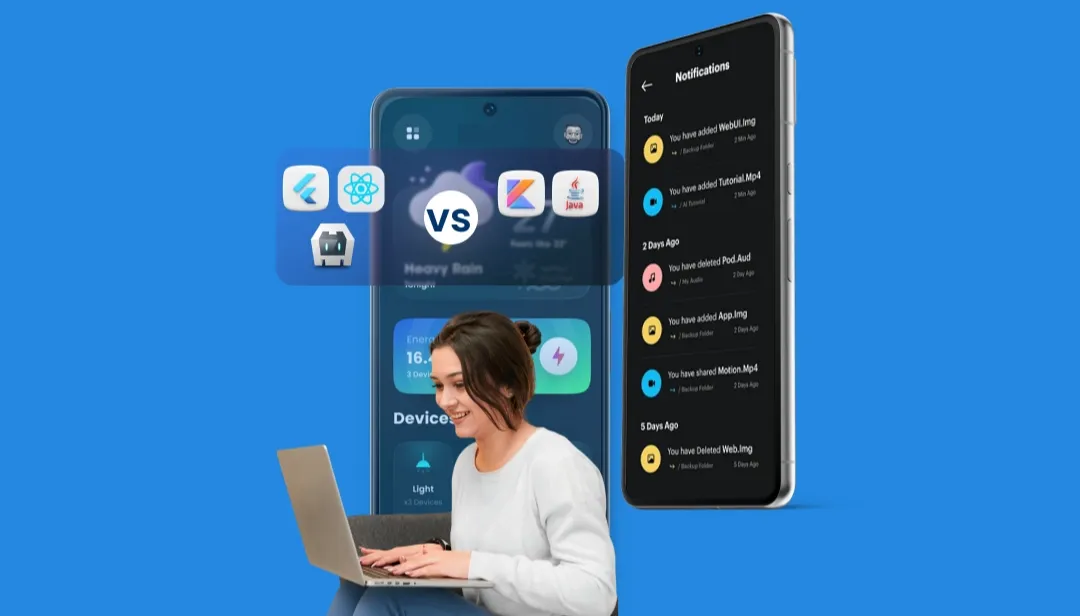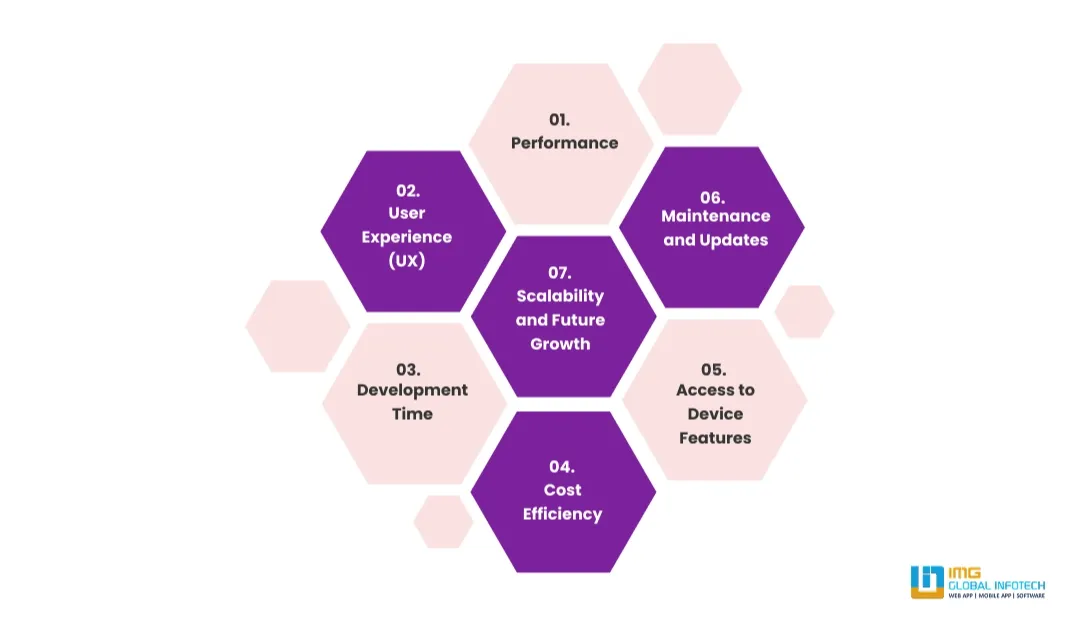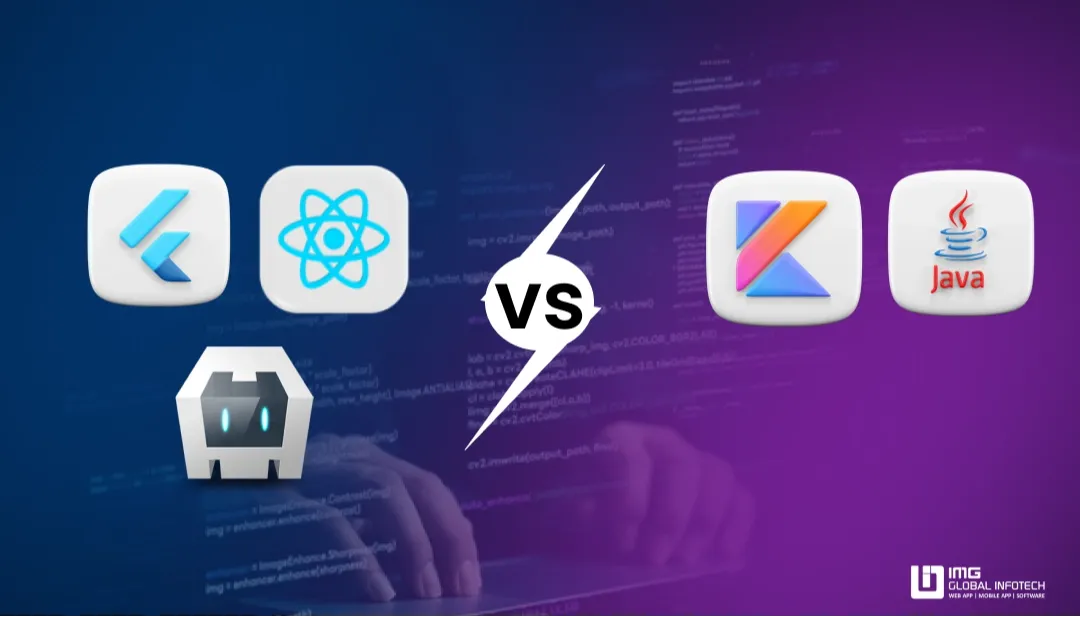Native Vs Hybrid App: Which One Should You Choose?
Neeraj Rajput
Jul 23, 2025

Choosing the right approach to mobile app development isn’t always straightforward. With so many frameworks, platforms, and user expectations available, one of the biggest decisions businesses face today is whether to build a native app or hybrid app.
Each option comes with its own advantages, trade-offs, and ideal use cases. While native apps are known for speed, performance, and seamless user experience, hybrid apps offer faster development cycles and cost efficiency, especially useful for startups or cross-platform launches.
As we move through 2026, understanding the difference between native and hybrid apps is more important than ever. In this blog, we’ll break down both approaches in simple terms, compare their pros and cons, and guide you toward native vs hybrid, the best fit for your project.
What is Native App Development?
Native app development refers to the process of building mobile applications specifically for a particular operating system, either iOS or Android, using the platform’s official programming languages and tools. For iOS, developers typically use Swift or Objective-C, while Android apps are built using Kotlin or Java.
Because native apps are created using the platform’s core technologies, they can fully access all the device features such as the camera, GPS, microphone, sensors, and gestures, without any limitations. This results in faster performance, smoother animations, and a more intuitive user experience that aligns perfectly with platform guidelines.
Native apps are installed directly from app stores like Google Play or the Apple App Store, and they run seamlessly within the device's operating system. While developing separate codebases for iOS and Android may take more time and resources, the end result is often a high-performance, stable, and polished application that can handle complex tasks and deliver a top-tier user experience.
What is Hybrid App Development?
Hybrid app development is the approach of a single mobile application development that works across multiple platforms typically iOS and Android, using one shared codebase. Instead of writing separate code for each operating system like in native development, hybrid apps are built using web technologies such as HTML, CSS, and JavaScript, and then wrapped in a native container to enable access to device features.
Popular hybrid frameworks like Flutter, React Native, Ionic, and Cordova allow developers to build apps that look and feel like native apps while significantly reducing app development cost and time.
Hybrid apps run inside a native shell and use webview or compiled code to render the interface. With tools like React Native and Flutter, the performance gap between native and hybrid apps has narrowed considerably, making hybrid apps a strong choice for startups, MVPs, and businesses looking to reach a broader audience without doubling their investment.
Native vs Hybrid App: Detailed Comparison

Choosing between native vs hybrid app development is a critical step in shaping your mobile app's future. Each approach brings its own set of strengths and trade-offs, depending on the goals of your business, the complexity of your project, and the user experience you aim to deliver.
Let’s take a deep dive into the key areas where hybrid and native apps differ, so you can make a confident and well-informed decision.
1. Performance
-
Native Apps:
Native apps are built using platform-specific languages, Swift or Objective-C for iOS, and Kotlin or Java for Android. Because they interact directly with the operating system and hardware, these apps deliver optimal performance, especially when handling high loads, animations, or complex user interactions. Whether it's a gaming app, video streaming service, or AR/VR platform, native development offers smoother transitions, faster loading times, and better responsiveness.
-
Hybrid Apps:
Hybrid apps use a single codebase that runs across platforms, which means the code needs to bridge between the app and the device’s operating system. This can introduce a layer of abstraction that affects speed and responsiveness. While modern frameworks like Flutter and React Native have closed the performance gap significantly, hybrid apps still may fall short in resource-heavy applications, especially when compared to their native counterparts.
2. User Experience (UX)
-
Native Apps:
User experience is often the most noticeable difference between the two approaches. Native apps feel more polished, fluid, and natural because they adhere closely to the design principles of the operating system. Buttons, gestures, transitions, and layouts behave exactly as users expect on their respective platforms. This native consistency often results in higher user retention, better engagement, and more positive reviews.
-
Hybrid Apps:
Hybrid apps can be designed to look and feel like native apps, but replicating platform-specific UX patterns perfectly is challenging. Sometimes, hybrid apps lack that “native feel,” especially on complex screens or animations. Although design libraries and UI kits are improving, small inconsistencies in layout or behavior can affect the user experience if not handled carefully.
3. Development Time
-
Native Apps:
Developing two separate apps,one for Android and one for iOS,means double the effort. Developers must write and maintain distinct codebases, follow different UI guidelines, and often manage two separate teams or workflows. This makes native development more time-consuming, especially if you're targeting both platforms from the start.
-
Hybrid Apps:
One of the biggest advantages of hybrid development is speed. With a single codebase for both iOS and Android, app development time is significantly reduced. This is especially useful for MVPs (Minimum Viable Products) or businesses aiming to launch quickly and iterate based on market feedback. Updates and bug fixes also happen faster, since changes only need to be made once and pushed to both platforms.
4. Cost Efficiency
-
Native Apps:
Native development is generally more resource-intensive and expensive. It requires hiring remote software developers skilled in platform-specific languages, often maintaining two codebases, and dedicating more time to testing and deployment. While the cost pays off in performance and UX, it can be a burden for startups or businesses with tight budgets.
-
Hybrid Apps:
With a shared codebase and fewer development hours, hybrid apps are more budget-friendly. You only need one team to build, test, and maintain the app for both platforms. This is a major benefit for small and mid-sized businesses that want to enter the mobile market without a heavy upfront investment.
5. Access to Device Features
-
Native Apps:
Native applications have direct access to all device hardware and OS-level APIs, including camera, GPS, Bluetooth, accelerometer, and background services. This is particularly important for apps that need deep integration with the device, such as health tracking apps, IoT platforms, or apps that rely on offline functionality.
-
Hybrid Apps:
Hybrid frameworks provide access to most native features through plugins or third-party libraries. However, there may be cases where specific features aren’t fully supported or require writing custom native code. This can make things more complex and sometimes unstable, especially as the OS evolves or plugins become outdated.
6. Maintenance and Updates
-
Native Apps:
Since there are two separate codebases, updates, bug fixes, and maintenance tasks must be done twice,once for Android and once for iOS. This can slow down the release cycle and increase long-term costs.
-
Hybrid Apps:
With a single unified codebase, updates are faster and easier to implement. Fix a bug or roll out a new feature once, and it reflects across both platforms. This also simplifies ongoing support, making it easier for small teams to manage the app efficiently.
7. Scalability and Future Growth
-
Native Apps:
Native development is more suitable for apps with long-term growth plans, complex architectures, or heavy traffic. It provides better flexibility, control, and room for scaling as your user base grows or your app evolves with more advanced features.
-
Hybrid Apps:
While hybrid apps are highly scalable for basic to mid-level applications, they may hit limitations as the app grows more complex. The more native-like functionality you add, the harder it becomes to maintain performance and code stability across platforms.
Native or Hybrid: Which One to Choose for Your Business?

When it comes to mobile app development, there’s no universal answer to the question: Should I go with native or hybrid? The right choice depends entirely on your business goals, project requirements, budget, timeline, and user expectations.
Let’s explore how to make a smart, strategic decision that aligns with your vision.
Choose Native App Development If...
1. You Need Top-Tier Performance:
Native apps are ideal for performance-intensive applications such as gaming, video streaming, augmented reality, or apps that rely heavily on animations and hardware-level interactions.
2. User Experience is a Priority:
If your audience expects a seamless, responsive, and platform-specific experience, native development will deliver the polish that modern users expect.
3. You Have a Long-Term Roadmap:
Businesses with scalable app visions,enterprise apps, complex workflows, or rapidly evolving features,will benefit from the flexibility and reliability of native development.
4. You’re Building a Platform-Specific Product:
If your app is targeted solely at iOS or Android users, there’s little reason to maintain a cross-platform codebase. Native is the most efficient in such cases.
5. You Want Full Access to Device Capabilities:
For apps that need deep integration with sensors, GPS, push notifications, offline sync, or background tasks,native development ensures stable, direct access.
Choose Hybrid App Development If...
1. You Need a Faster Time to Market:
Launching your app quickly across multiple platforms? Hybrid development can cut your timeline in half and help validate your idea faster.
2. You’re Working with a Limited Budget:
For startups, SMBs, or MVPs, hybrid apps reduce costs significantly without sacrificing much on quality,especially with modern frameworks like Flutter and React Native.
3. You Want to Reach a Broader Audience from Day One:
With one codebase, you can deploy your app to both iOS and Android users simultaneously,boosting your initial visibility and reach.
4. Your App Doesn’t Rely Heavily on Hardware Features:
If your app is content-based, form-driven, or service-oriented (e.g., news, eCommerce, booking, etc.), hybrid solutions offer great efficiency with minimal trade-offs.
5. You Want Easier Maintenance and Updates:
One codebase means quicker bug fixes, updates, and feature rollouts,making hybrid apps easier to manage with smaller development teams.
Conclusion
Choosing between native and hybrid app development isn't just a technical decision,it's a strategic one. Both approaches have come a long way, with powerful frameworks and tools available to support fast, secure, and scalable mobile experiences.
If you're building an app that demands high performance, deep device integration, or pixel-perfect UX, then native development is likely the best route. On the other hand, if your goal is to launch quickly, reach a wider audience, and stay within budget, hybrid development can be a smart, cost-effective solution.
At the end of the day, it all comes down to your business objectives, technical needs, and future plans. If you're still unsure, partnering with an experienced android app development company can help you make the right call,one that balances quality, time, and return on investment.
Neeraj Rajput is the co-founder of a leading IT company with over a decade of experience in technology consulting, product development, and digital transformation. With a passion for solving complex business challenges through smart tech solutions, he shares insights on innovation, leadership, and the evolving IT landscape












